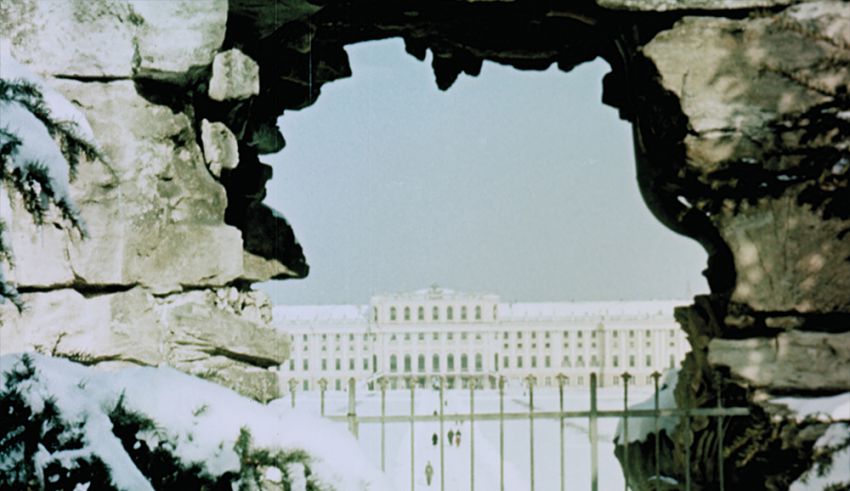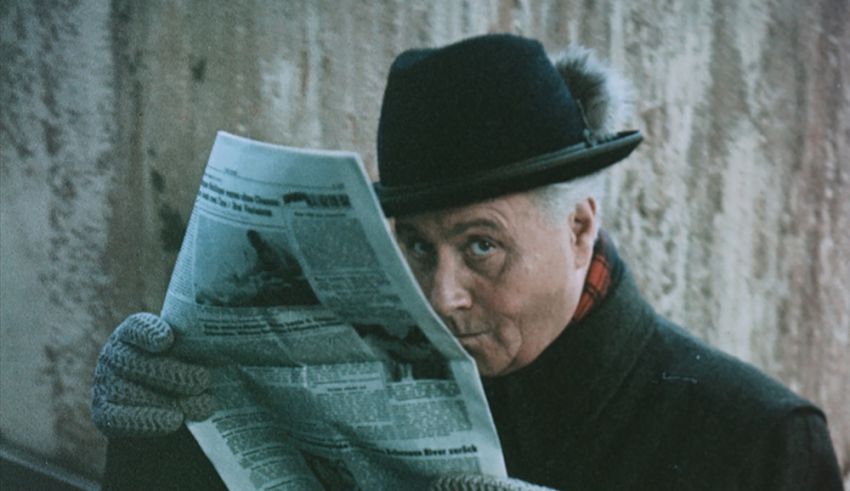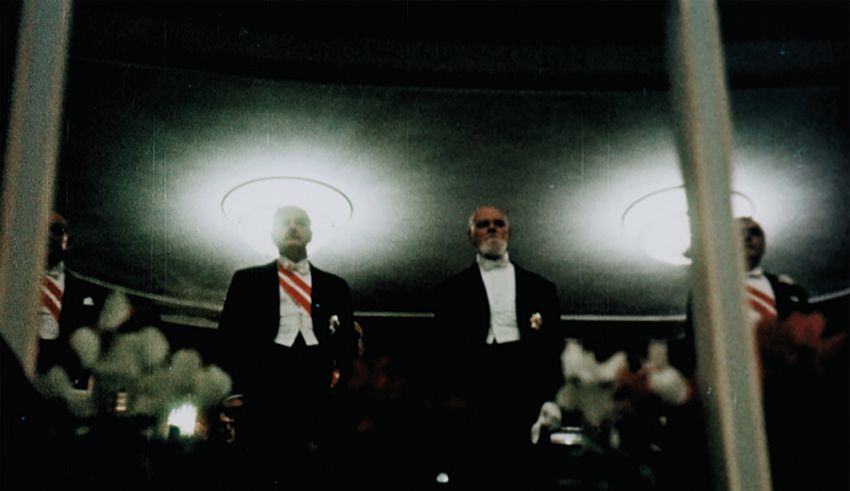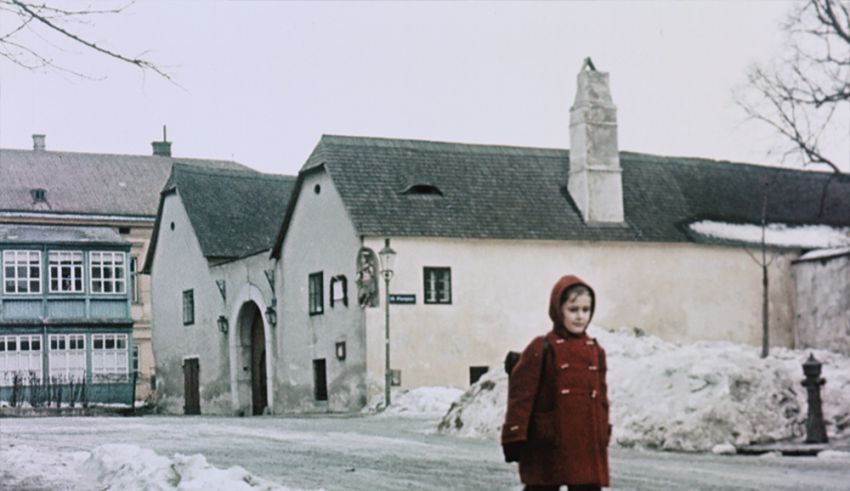In celebration of Film Academy Vienna’s 65 years of existence, the department has initiated a large-scale archival project entitled Metternichgasse 12. Eine Archäologie […An Archaeology], which is the first project ever to devote itself to the origins and development of this Austrian talent factory.
One of the first films to be dug up over the past few months by the archival team of Film Academy Vienna was Österreich, Dein Herz ist Wien [Austria, Your Heart Is Vienna]—a 1956/57 cultural film produced at the department as a tourism marketing tool for the City of Vienna. Film Academy Vienna had only been founded in 1952, so this work was a very special find for the researchers, who were able to glean from it some initial conclusions about the Film Academy’s early years. “It was an interesting discovery for us, because it showed us that films were being made here even this early on—we hadn’t been sure exactly when the Film Academy had begun to include practical training and production work,” explains film scholar Kerstin Parth, a member of the four-person team along with Claudia Walkensteiner-Preschl, Michaela Scharf, and Albert Meisl. Such filmic witnesses to their times are of central importance to this research project, for there exist but few other documents from Film Academy Vienna’s early days. For this reason, the team members are also combing through the university’s own archives as well as speaking directly with former students and graduates who were present back then.
Beyond a Canonised Historiography of Film
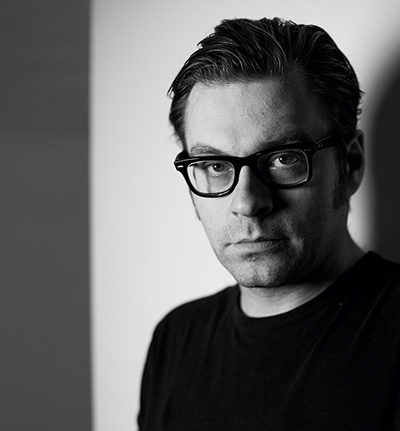
A further important point of this archival project is to quite generally document and study the film material that has been kept at Film Academy Vienna, all of which is now at the Austrian Film Archives (Filmarchiv Austria) in the historic buildings of Schloss Laxenburg. Team member Albert Meisl, himself a student at Film Academy Vienna, is spending the most time viewing these early filmic works. “We set ourselves the task of finding works that, as a rule, haven’t been screened since the 1970s and 1980s,” he explains. Some historical films by former students and graduates such as Ulrich Seidl and Götz Spielmann have indeed been (re-) issued or screened recently, but the vast majority of them have simply been slumbering in the archives. “What we want to do is look beyond a canonised film historiography oriented on great directorial personalities in order to get an impression of the bigger picture—to see what was being produced during the Film Academy’s early decades and how these films are or aren’t related to each other.
Alongside Österreich, Dein Herz ist Wien, the researchers have already hit upon a few more filmic treasures in their archival explorations so far—like Tamara Euller’s documentary Rosa Lila Villa from 1984. The Rosa Lila Villa is an LGBT institution that was an absolute first in Austria at the time, and Euller’s film about it shows how students of Film Academy Wien have long been taking on themes of contemporary interest.
There is also Peter Sämann’s All About Nothing from 1969/70, which met with uproarious applause when it was given its latter-day première at the Film Academy screening in Vienna in the autumn of 2016. “That was a real discovery for us, particularly in light of its experimental qualities, and it was also among the earliest films we’d found and watched,” says Kerstin Parth.
Encounters
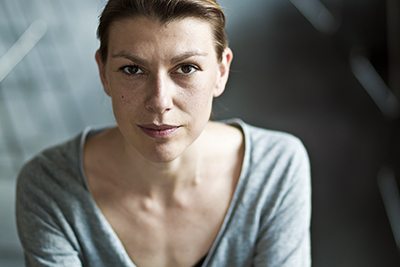
In the case of most the archive’s films, one can assume that they were screened either not at all or very rarely following their completion. Therefore, the ORF television documentary Metternichgasse 12 showed short films from Film Academy Vienna created from the 1970s onward, making them known to a broader public. But this survey did not include all of the films at issue, here. And for many of the filmmakers whom the research group has contacted as part of this project, it has been years since they’ve watched their own films, which they had perhaps never figured on ever seeing again. After all, these works were printed on 16 or 35 mm film, long before the appearance of VHS cassettes, DVDs, or the Internet. Albert Meisl, who has already conducted in-depth conversations with several of them, describes how happy these filmmakers are about the attention their early films are now receiving: “They’re occasionally also irritated or horrified, because some of them haven’t watched these films since then. So it can also take on the character of a confrontation. But the dominant emotion is happiness.”
Team Spirit
The filmmakers’ encounters with their early works are also part of the oral history project that is being conducted as part of this research. Several-hour interviews together with students include screening of the films by a particular filmmaker and subsequent discussion of them with him or her. One of the interviewees was director Barbara Albert, who—as Kerstin Parth relates—took a trip through time of sorts as she remembered quite vividly how her student experience was, during which she “greatly enjoyed and was able to make productive use of the artistic freedom that we had at the department back then.” As Barbara Albert studied, she and other students formed a group that still does highly successful work today: coop99.
This kind of team spirit can really be considered one of the first findings of this archival project. “Collaboration between the students during their studies is something that quite often continues on into their professional lives,“ says Albert Meisl, “and it’s part of Film Academy Vienna’s good tradition for people to become acquainted, connect on an artistic level, and form working relationships that they end up carrying over into their filmmaking careers.” The interdisciplinary collaboration anchored firmly in the Film Academy’s curriculum between the individual degree programmes Screenplay Writing and Dramaturgy, Directing, Editing, Cinematography, and Production also has the effect that numerous graduates end up working in film-related fields other than those for which they were trained. “Learning how to work in film isn’t simply a matter of one’s specific degree programme, and this quality is likewise part of Film Academy Vienna’s tradition,” says Meisl.
In the coming months, this group of researchers will be deriving many other important findings from their archival project, but one thing is already clear: while Film Academy Vienna started out producing run-of-the-mill cultural films like Österreich, Dein Herz ist Wien, the past 65 years have seen it develop into an institution that is open to experimentation and highly regarded the world over.

